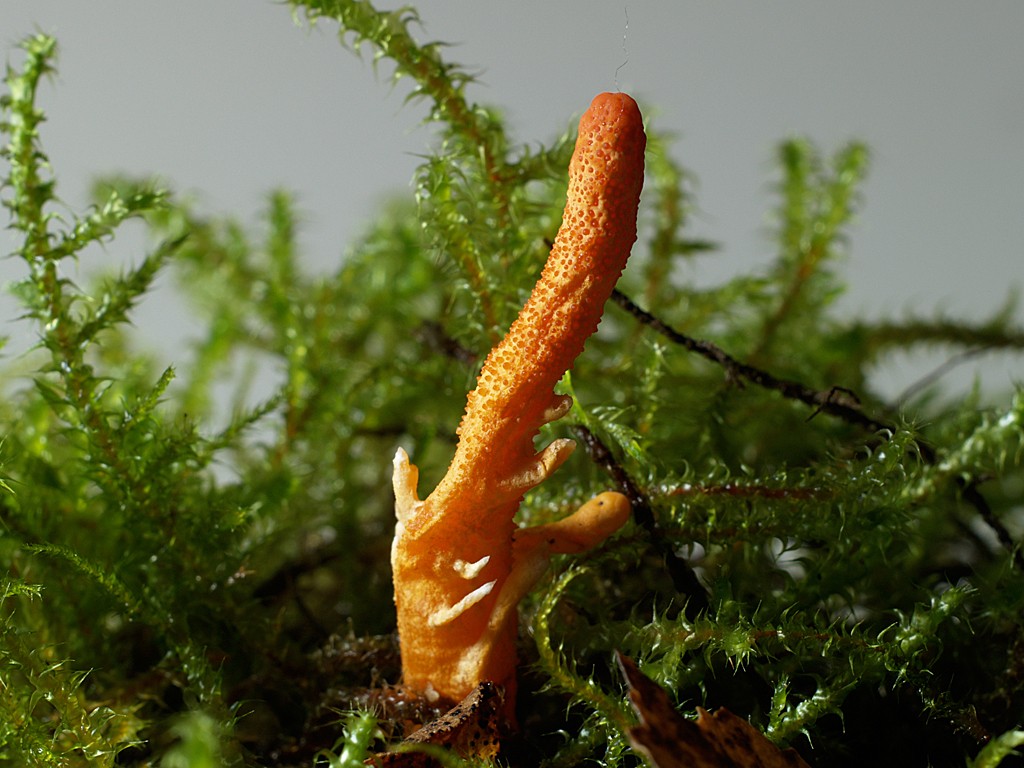Could a fungus be the last of us? That question is the premise of HBO’s critically acclaimed series The Last of Us. That’s what a Georgia Gwinnett professor is studying.
Based on the video game, the series follows an ominous, but hopeful tale of a small group of survivors along the lines of other recent post-apocalyptic dramas like The Walking Dead.”
What sets The Last of Us apart is the seemingly terrifying plausibility of its plot. Set in 2023, events in the show take place 20 years into a global pandemic caused by a mass fungal infection, which causes people to transform into zombie-like creatures and collapses society.
The fictional fungus in the show is based on the Cordyceps, a genus of fungi that is parasitic on insects and other arthropods. In some insects, the fungus can grow a network of roots through the body and into the muscles, flooding the brain with chemicals that compel the host to go where conditions are perfect for the fungus to grow and release its spores.
To a layperson it seems quite plausible, but according to an actual subject matter expert at Georgia Gwinnett College, we don’t need to start stocking up on food and fortifying our homes quite yet.
Dr. Lee Kurtz, professor and chair of biological sciences at GGC says: “Definitely not! Cordyceps could not grow in the human body, our internal temperature is too high for them to survive. The fungus can infect insects, most notably ants and caterpillars, spiders and more commonly other fungi.”
Kurtz confirmed that what Cordyceps can do to its host is astounding, but somewhat unusual.
“When they infect insects, they take control and force the insect to climb to a high spot so it can release its spores,” she explained. “But these spores are not terribly common, especially when compared to other fungi like Aspergillus and Penicillium that are found in air.”
People might be interested to know that, even though they don’t have to worry about parasitic fungi turning them into zombies, other fungi can be found all over – and in – the human body.
Some of them are welcome guests, others not, said Kurtz.
“Fungi are everywhere,” she said. “Fungi, mainly yeasts, can be found on our skin and in our gut. They play an important role in helping us maintain homeostasis. However, there are fungi that can cause infections if they can get access. They are generally opportunistic pathogens, not true pathogens. They don’t normally cause disease in humans, but if someone is immunocompromised or has an open wound, etcetera, they can take advantage of that access to cause disease.”
While The Last of Us might be doing to fungi what Jaws did to sharks in the collective consciousness, Kurtz wants people to know that they play an essential role in maintaining life on our planet.
“Fungi can live in dark, damp places — which most people know — but they also grow on drywall, ceiling tiles, even paint on air vents. We wouldn’t have plants without fungi in the soil. The fact is that they are critical to our ecosystem and can be found anywhere we look.”
Recent county actions should improve mobility, safety
The Gwinnett County Board of Commissioners have taken several actions to increase mobility and safety. Here are some highlights:
 The Board approved Gwinnett Transportation to apply for two grants worth $25 million each. It’s part of the U.S. Department of Transportation’s Rebuilding American Infrastructure with Sustainability and Equity grant program. The first grant will be used to upgrade the Gwinnett Place Transit Center’s condition and how it functions. The funding will build an energy efficient facility with onsite customer service and ticketing connections and would support zero emission transit vehicles. The second grant would go towards building a multi-use trail from Gwinnett Place to McDaniel Farm Park.
The Board approved Gwinnett Transportation to apply for two grants worth $25 million each. It’s part of the U.S. Department of Transportation’s Rebuilding American Infrastructure with Sustainability and Equity grant program. The first grant will be used to upgrade the Gwinnett Place Transit Center’s condition and how it functions. The funding will build an energy efficient facility with onsite customer service and ticketing connections and would support zero emission transit vehicles. The second grant would go towards building a multi-use trail from Gwinnett Place to McDaniel Farm Park.
Additional sidewalks are coming to Plazas Las Americas area.The county is enhancing safety for pedestrians around Plazas las Americas. New sidewalks will be installed on Pleasant Hill under the Ronald Reagan Parkway overpass. In addition to new sidewalks, a pedestrian warning system will alert drivers. Smart Road Technology was awarded the construction contract. The upgrades are funded by SPLOST at a cost of $868,000.
In addition, the Gwinnett Police are getting six outdoor security cameras. The Evermore Community Improvement District donated six new security cameras, which cost $2,395 each, to Gwinnett Police. These new cameras will work together with Gwinnett Transportation’s cameras; in addition to providing more safety to business parking lots and storefronts in the Evermore district.
Tag agent announces new kiosk in Lilburn at Kroger
Gwinnett County Tax Commissioner Denise R. Mitchell announces the installation of the ninth tag-renewal kiosk in Gwinnett County. The new self-service kiosk was recently installed in the Kroger store at 3050 Five Forks Trickum Road in Lilburn. The Kroger is in Five Forks Crossing.
The new kiosk is accessible during the store’s operating hours, 6 a.m. to 11 p.m., Sunday through Saturday. To renew at a kiosk, drivers must have an up-to-date Georgia driver’s license and a correct address on their renewal notice. They must have liability insurance and proof of a passed emissions inspection must be on file with the state.
- Have a comment? Send to: elliott@brack.net











Follow Us